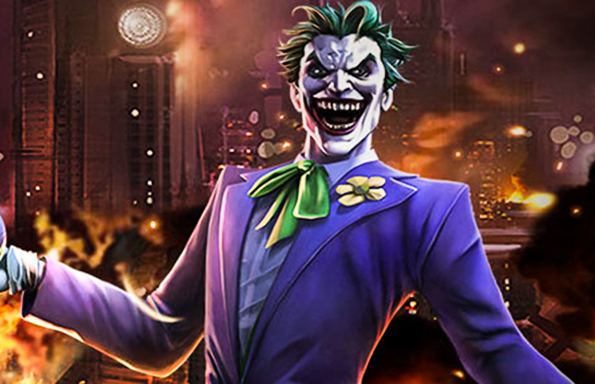OPINION: Panic around potentially offensive content isn’t always warranted
New “Joker” movie was expected to be alt-right and pro-incel, didn’t live up to outrage

The new “Joker” movie caused a lot of controversy on social media. People were worried that it would feed into alt-right ideology. Upon the movie’s release, these rumors were revealed to have been blown out of proportion.
October 11, 2019
We live in a society. A society that is interconnected and informed to a greater degree than one would ever have thought possible. Cable news, smartphone headline alerts and personalized 24/7 information feeds mean that, for the most part, the average citizen is more educated and knowledgeable about foreign and domestic affairs.
Mass media has connected and educated us. But it has also misinformed us. The groupthink and instant-share dynamic of Twitter, Facebook and Instagram combined with the attention-grabbing headlines of Fox and CNN have created a feedback loop of shock value entertainment, predicated on clicks and likes.
The easiest way for a news organization to do this? Capitalize on online reactionary movements and theories posited by bloggers, Tweeters and Facebookers, and watch the articles fly in.
The most recent example of this is the craze around the new “Joker” film. In the months leading to the film’s release, conspiracy theories and opinion pieces flew at lightspeed around the internet, especially pertaining to the film’s alleged connection to the alt-right and “incel” culture.
Now, perhaps some of these fears and theories were founded. Certainly, some aspects of the Joker’s status as a pop culture character have made him appealing to members of the alt-right (outsider status, anti-society stance, etc). The character has also historically struck a chord with members of the incel/MRA movement, and individuals who identify as anarchists or advocate for a dramatic restructuring of society will often rally around images or videos of the Joker, in his many incarnations.
“I think that it has the potential to inspire the underground incel culture,” said freshman neuroscience major Isabella Butcher. “The thing with the ‘Joker’ movie is that it gives us this horrible, legitimately bad person, and expects us to feel bad for him … I think that’s super dangerous.”
However, it’s also worth mentioning that there was no codified movement by any major alt-right group to cement the new “Joker” film as a rallying cry for violence and hate. Some scattered individual online reactionaries may have, for the sake of irony (or “the lulz”), posted their allegiance to the Joker or adopted the new film as their guiding star, but those who genuinely believe this are (at least ostensibly) few and far between.
“I feel like it’s an oversimplification of a complicated issue,” said Luke Pietsch, freshman animal sciences major, when asked whether there was a connection between the movie and mass violence. “I don’t feel like it’s a deep enough look into the issue.”
For the most part, however, the main actors behind the flood of think pieces and self- righteous tweet threads were journalists and media writers. Those who made the most noise about the film’s alleged status as a hate symbol were also those operating off little to no proof. Instead, online media outlets churned out hit pieces about the film without actually having seen it and criticized the actors and those connected with the film, most of whom had no allegiance to any cause resembling right-wing or violent extremism.
All of this is a roundabout way of saying that in many cases when a political panic or a moral outrage takes hold of the American zeitgeist for even a short while, mass media is most often the one whipping it into a whirlwind.
Consider the Satanic panic of the 1980s, the tenuous connection between video games and mass violence or even the Dungeons & Dragons moral panic, when parents and media outlets alike confused a game meant for sweaty virgins with the latest and greatest means to summon Beelzebub.
Most of these collective freakouts happened because we were told they were inevitable.
The message in the 1950s was, “If you’re not scared of communism, you sure as hell should be.” It seemed every day you’d hear, “Maybe your neighbor’s a communist. We don’t know,” from NBC, coyly winking and sucking on an oversized lollipop.
To clarify, this is in no way blaming mass shootings or any kind of real violence on the media, though if someone’s intent on violence, a media portrayal can push them over the edge.
“If someone’s already inclined to do some sort of violent act, a media portrayal can encourage that, although obviously not in the cases of all viewers,” said Traci Gillig, WSU professor of communication.
However, this article is not calling for a collective dismantling of all media outlets. Interconnectivity and commodification of information has helped inform members of the population that otherwise might stay woefully ignorant.
What it is calling for is nuance and research in mass media, by both news outlets and news consumers. It is the responsibility of both suppliers and consumers of information to vet that information, and make sure it’s sound. I don’t expect the readers of the Evergreen to take everything I say as gospel.
Do independent research, and don’t trust everything you hear. If individuals can live by that standard, the capacity for misinformation to spread will be greatly lowered, and these moral panics will slowly become less and less common. The Joker character may be an agent of chaos, but that doesn’t mean CNN has to be.

















tim • Oct 16, 2019 at 5:04 pm
I grew up during the cold war, where there were fallout shelters and drills.
In the Air Force I guarded the bombers with nukes at a SAC base in upstate New York.
Popular slogans were “better dead then red”. Thankfully I missed the McCarthy era.
The D& D crown were a bunch of losers. Now its Fortnight causing a stir. Next year it will be something else.